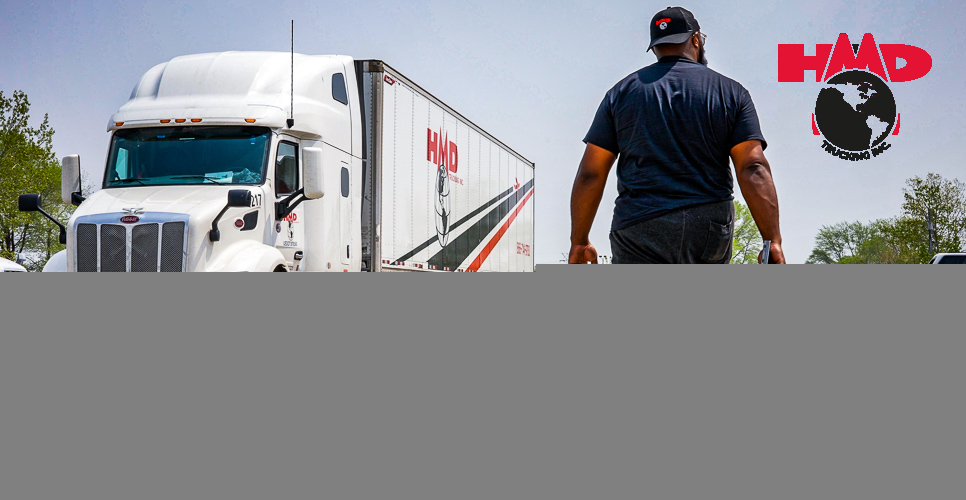No matter how much experience you have in driving a truck, if you feel the call to explore the endless highways, you will enjoy every moment on the road. However this feeling typically disappears without a trace when the tax period approaches. Do you know how to avoid putting yourself under emotional strain and falling out of love with your life’s work? Take it easy and do not waste the opportunity to save your money with the help of tax deductions for truck drivers.
We have compiled some tips on how to manage various kinds of business expenses throughout the year to reduce annual state taxes and local taxes and reap eventual benefits.
Contents:
- Who Qualifies as a Truck Driver for Tax Purposes?
- Requirements for Claiming Tax Deductions as a Truck Driver
- Common Tax Deductions for Truck Drivers
- Non-deductible Expenses for Truck Drivers
- Benefits of Claiming Tax Deductions as a Truck Driver
- List of Tax Deductions for Owner Operators
- Conclusion
Who Qualifies as a Truck Driver for Tax Purposes?
The most significant change in trucker taxes came with the Tax Cuts and Jobs Act of 2017. This law fundamentally changed who can deduct business expenses.
- Company Drivers (W-2 Employees): If you are a company driver and receive a W-2 form, you can no longer deduct unreimbursed work-related expenses. This includes things like tools, supplies, and other personal costs. The standard deduction was increased to compensate for the removal of these individual deductions.
- Owner-Operators & Independent Contractors (1099): If you are self-employed, you are still entitled to deduct all ordinary and necessary business expenses. You report your income and expenses on a Schedule C form, which allows you to lower your taxable income significantly. This article focuses on deductions for this group.

Requirements for Claiming Tax Deductions as a Truck Driver
The tax inspector determines whether you meet the requirements for claiming a tax deduction by checking tax documents you have.
A company driver now submits a W-2 and can no longer report separately such things as fuel expenses, maintenance or parking fees on truck driver tax credits.
Owner operators' tax write-offs are based on 1099-NECs, which they receive from their customers for each transaction exceeding $600 at the end of the year. They then fill in Schedule C for per diem expenses and Schedule SE for self-employment taxes. All these forms should be submitted along with Form 1040 to file an annual income tax return.

Common Tax Deductions for Truck Drivers
Deductible expenses for truck drivers include a long list of running costs, and to claim them you have to submit to the IRS a record of the expense, including receipts and other supporting documentation.
Truck Driving Education
It is very important for truck drivers to constantly improve their professional skills by adding endorsements. If you are going to attend a truck driving school to get a CDL, you can deduct the cost of tuition and manuals from your taxes. Note that if you are getting a degree in, say, medicine or law, you cannot count on tax deduction, because it is not related to truck driving.
Vehicle Expenses
As an owner-operator, your truck is your biggest expense, and you have two methods to deduct its operational costs. You must choose one method for the year.
1. The Standard Mileage Rate: This is a simplified method where you take a standard, IRS-set deduction for every business mile you drive. For 2025, the rate is 69 cents per mile. This rate is designed to cover all the costs of operating your truck, including fuel, maintenance, tires, insurance, and depreciation. You cannot deduct the mileage rate and also deduct your fuel and repair bills separately.
2. The Actual Expense Method: This is the method most owner-operators use. Instead of a flat rate per mile, you deduct the actual dollar amount you spent on all vehicle-related costs. This includes:
- Fuel and oil
- Tires
- Repairs and maintenance
- Insurance premiums
- Lease payments
- Registration and license fees
- Truck depreciation
This method requires meticulous record-keeping and saving all receipts, but it often results in a larger total deduction than the standard mileage rate for heavy trucks.

Travel Expenses
For an OTR driver, travel expenses are the biggest source of deductions. This category is primarily for your meals, but it also includes lodging and incidental costs. The IRS gives owner-operators two ways to claim their meal expenses:
1. The Per Diem Method (Most Common): This is the simplest and most popular method. The IRS sets a standard daily rate for meals and incidental expenses (M&IE). For 2025, the rate for the transportation industry is $69 per full day OTR and $51.75 for partial days (days you depart or return home). You are allowed to deduct 80% of this amount.
- Full-Day Deduction: $55.20 ($69 x 80%)
- Partial-Day Deduction: $41.40 ($51.75 x 80%)
The best part? You do not need to keep individual receipts for every meal. Your ELD logs are your proof, as they show which days you were away from your tax home overnight.
2. The Actual Expense Method: Alternatively, you can keep the receipt for every single meal and incidental expense you have on the road. You would then total these costs and deduct 80% of that total. This method is far more work and is generally only beneficial if you consistently spend much more than the $69 daily per diem rate.
Office Expenses
You are allowed to deduct certain office expenses, including software, photocopying, stationery (such as pens, staplers and paper clips), and postage. Be ready to show that these are requisite business expenses, not personal expenses.
Insurance Premiums
When determining the taxable amount, owner operators can cut off the value of insurance premiums associated with business, such as liability insurance, property damage insurance, and loss of income insurance that covers cargo damage or loss.
Self-employed drivers can also submit their personal health insurance receipts for tax deduction. As it is not a commercial expense, health insurance premiums are deductible as an “above the line” deduction on Form 1040.
Communication Expenses
All communication expenses, such as desktop or portable computers for work, or monthly ISP charges, are deductible. The costs of telephone service, communication equipment, mobile phones, and business calls while on a business trip, including sending faxes, are deductible as long as the taxpayer can justify them. Be ready to produce your contract with the mobile carrier or ISP if asked to.
Association Fees
Many self-employed truck drivers join trucker unions or other truck operator associations. This kind of membership provides a lot of benefits for small-business owners, such as access to exclusive products and valuable services that help their trucking business to grow. Association fees and dues are deductible.

Non-deductible Expenses for Truck Drivers
Self-employed drivers who receive 1099-NECs can claim most expenses related to their business for tax deduction. However, some expenses are not deductible. To avoid future penalties, be sure to submit the correct data for a tax deduction, done on a fair and reasonable basis that reflects the purpose of the expense.
Trucker Meals Deduction
Drivers who spend most of their working time away from home can claim a trucker meals deduction. Long-distance drivers who drive far from their home or office (shown in the tax declaration as “tax home”) can deduct 80% of the cost of meals if they choose to keep detailed receipts. This can be beneficial for drivers who spend more than the per diem rate on food. Overnight lodging is also fully deductible, but only if it's directly related to business travel.
You can submit all your food bills and claim your actual expenses. However, the per diem method implies less paperwork and fewer supporting documents, because there is no need to keep the receipt for every snack or coffee.
If you mostly drive locally, less than a night away from your “tax home”, meal expenses will not be deductible.

Reimbursed Expenses
If your business partners reimburse your expenses, you are not allowed to include them in the list of tax deductions.
For example, you can deduct from the payable tax amount the legal fees you pay, including an objection or appeal to a business court. However, the full amount of these deductible fees must first be reduced by any other reimbursement of your expenses that you receive.
Home or Personal Cell Phone
If you use the same device for both your business and personal needs, you can only deduct the part used for business, and you must prove that these expenses were intended exclusively for work.
Everyday Clothing
The IRS is very specific on this point: you cannot deduct the cost of clothing that can be considered suitable for everyday wear, even if you only use it for work. This includes common items like jeans, flannel shirts, or standard work boots.
However, you can deduct 100% of the cost of required safety gear and logoed uniforms. This includes:
- Steel-toed boots;
- Hard hats;
- Safety glasses or goggles;
- High-visibility vests;
- Specialized work gloves;
- Any clothing with a company logo permanently affixed to it that you are required to wear.

Benefits of Claiming Tax Deductions as a Truck Driver
Claiming tax deductions that relate to your trucking business has many benefits, mainly because it allows you to save on taxes while getting things you need for doing business.
Reduce Your Taxable Income
By deducting the bulk of your expenses from your taxable income, you pay less in taxes. How does this work? You take your gross income and then calculate your adjusted gross income on your tax forms by reducing it by the amount of the deductible expenses. As a result, you only have the adjusted gross income amount taxed.
Get a Refund
Owner operators can claim a tax refund for the previous tax period. You are eligible for a refund when the taxes paid to the IRS are greater than the actual tax payable.
It actually means that you can get more tax refunds by expanding your list of owner operator tax deductions for the previous fiscal year.
Increased Cash Flow
You can cover the daily needs of your business without affecting your cash flow. You can even increase it by lowering your taxable income or getting tax refunds. Sounds great, doesn’t it?

List of Tax Deductions for Owner Operators
The list of standard tax deductions for owner operators typically includes the following:
- Fuel expenses;
- Repairs and maintenance, such as equipment expenses and depreciation;
- Office expenses;
- Insurance premiums;
- Licenses and permits;
- Depreciation;
- Rental and truck lease;
- Mileage deductions;
- Travel costs, such as meals, accommodation, parking and toll charges;
- Communication expenses;
- Association membership fees.

Conclusion
The list of tax deductions for owner operators given in this article is not complete. Tax cut-offs may be different in each individual case, but a sensible approach to tax deductions can even see you derive profits from your business expenses. It is important to keep a record of any costs you have that are job-related throughout the tax period. The tax season may then become your favorite time of the year. You can also check out our hazmat truck driver jobs page which we update regularly.
Being part of a great team in a leading trucking company, such as HMD Trucking, you can always ask an expert for help if you have any doubts.
Whether you want a position of a company driver or you are just starting your career as an owner operator, we encourage you to join the HMD team. Please fill in the form for the driver’s job below.
Can't decide between flatbed or dry van trailer to drive? Our article explores various factors, such as load capacity, accessibility, versatility, and operational considerations, to help you determine which type of trailer best suits your specific needs.


